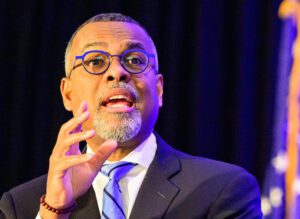Who is a member?
Our members are the local governments of Massachusetts and their elected and appointed leadership.

Eddie Glaude Jr. addresses local leaders in Boston during the MMA Annual Meeting & Trade Show on Jan. 19.
If we want to build a true multiracial democracy in America, we must stop treating diversity as a problem to be managed and instead cherish it as our greatest strength, scholar Eddie Glaude Jr. told local leaders in Boston during the MMA Annual Meeting & Trade Show on Jan. 19.
Glaude, a bestselling author, political commentator and professor in Princeton University’s African American Studies Department, said organizations too often view diversity, equity and inclusion as a chore to be completed, a box to be checked, or a tactic to reduce unease during politically fraught moments. Instead of viewing DEI as a separate concern, he said, leaders need to treat diversity as a critical measure of their mission and as a key metric of success.
“If we come to understand ourselves without the tricky magic that makes us white and Black, or this or that, but to see ourselves as Americans in the full light of our history, then diversity sits at the center of our national identity, and not as a problem, not as a philanthropic gesture, but at the heart of who we are,” Glaude said. “It should be at the heart of your service, to treat and govern all with equal regard.”
During his conference-opening keynote address, Glaude, a nationally renowned voice on race and democracy, urged leaders to engage honestly with their communities about race.
Achieving a just society, he said, doesn’t involve one privileged group magnanimously inviting everyone else to the table — it means understanding that the table already belonged to everyone in the first place. No one owns the table, and people shouldn’t take it upon themselves to decide who deserves invitations.
Glaude said the problem is rooted in tension between the notion of “we” — and who gets included in the definition of “we” — and those who are seen as “other.” Too often, instead of people living DEI as a value, he said, “it is seen as something that you possess to give to someone else. We allow you into our school. We hired you to join our leadership team. And you are still demanding something else.”
Americans must reevaluate their relationships with each other, Glaude said, because “old ghosts haunt the nation.” America’s racist past isn’t distant and isn’t past, said Glaude, 55, who noted that his father wasn’t able to vote in their native Mississippi.
“The fever still holds,” Glaude said. “We saw it on Jan. 6, when the mobs sacked the People’s House, shouting ‘stop the steal.’ That was a revolt predicated on grievance, resentment and hatred. We see it in the ongoing efforts to delegitimize our democracy by sowing distrust in the electoral processes and officials. We see it in the assault on women’s rights, for control of their own bodies, the attack on voting rights, on LGBTQ+ rights. In so many ways, what we are witnessing today is an all-out assault on the gains of the 1960s.”
The racism and violence persist, Glaude said, aided and masked by the mythology of “the American experiment” and the notion of the country as “the shining city on the hill.” He said we need to look unflinchingly at who we are as a nation, and how our nation’s actions have consistently valued some citizens at the expense of others.
“We must think of ourselves differently because the problem is, and always has been, us,” he said. “We are the serpents in the garden. We hoard benefits to some and distribute benefits to others.
“We have to admit that our institutions don’t look the way they look by accident. There’s a history here, there are deliberate choices here.”
During a question and answer session, Holyoke Councillor Juan Anderson-Burgos spoke about his election six years ago as the first Latino councillor for Ward 6, in a community that is more than 50% Latino. He said he recalled reading “Robert’s Rules of Order” and feeling alienated from the process and, at times, unwelcome in the community.
“In that room, when I am with these people, I feel like an impostor,” Anderson-Burgos said. “This is my fourth term going in, and I still feel like an impostor, and I truly believe in my heart that it’s my experiences from the white people in my municipality. It was how I was treated. Always outcast. You cannot sit at this table.”
Glaude acknowledged the pressure that people of color feel to leave part of themselves at the door when entering rooms of power. He urged Anderson-Burgos and others, however, to “bring the fullness of ourselves into the room,” and not assume the responsibility of making others feel comfortable with that.
“I tell my students all the time: The world conspires to make you small,” Glaude said. “And the question you have to ask yourselves repeatedly is, ‘Will you be complicit?’ I refuse to be complicit.”
Glaude, who frequently appears on news shows including MSNBC’s “Morning Joe,” is the author of the New York Times Bestseller “Begin Again: James Baldwin’s America and Its Urgent Lessons for Our Own,” and the forthcoming “We Are the Leaders We Have Been Looking For.”